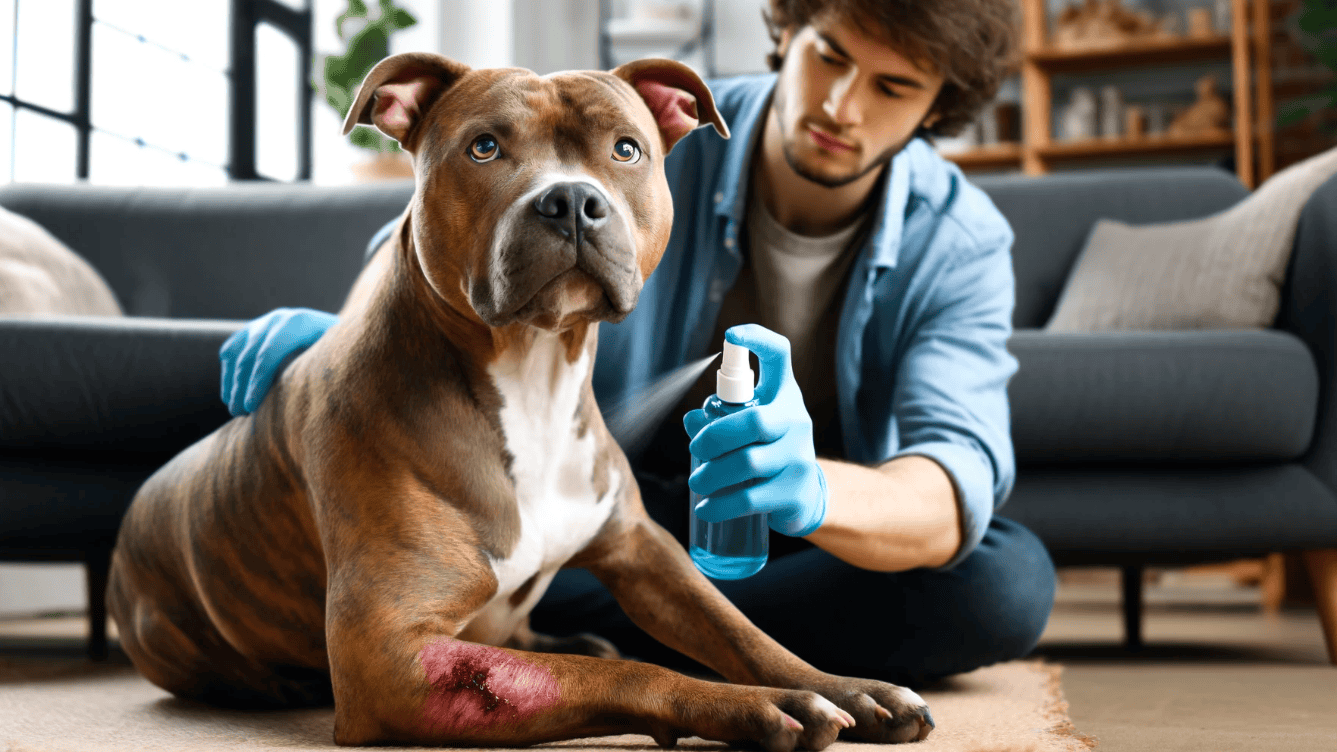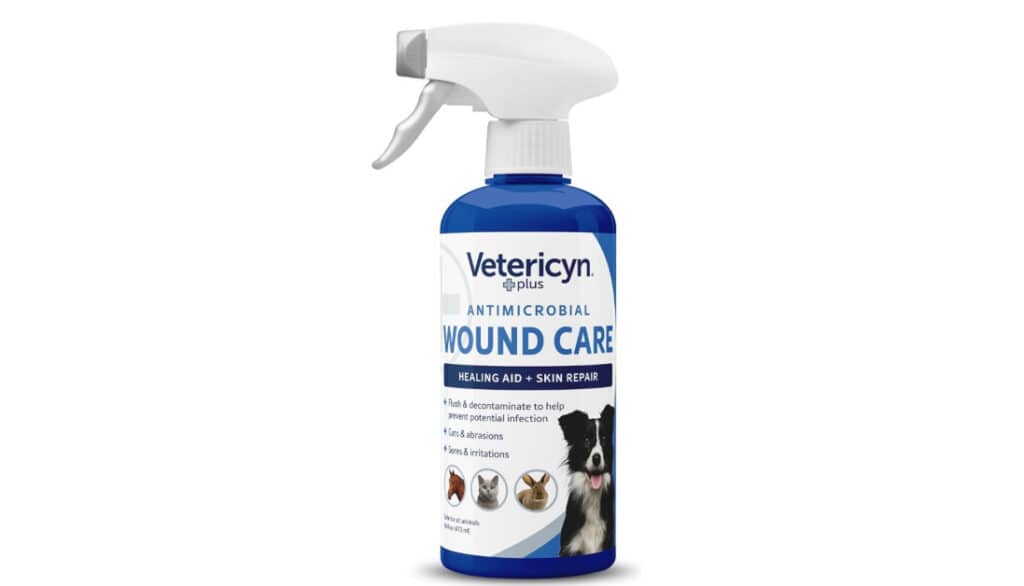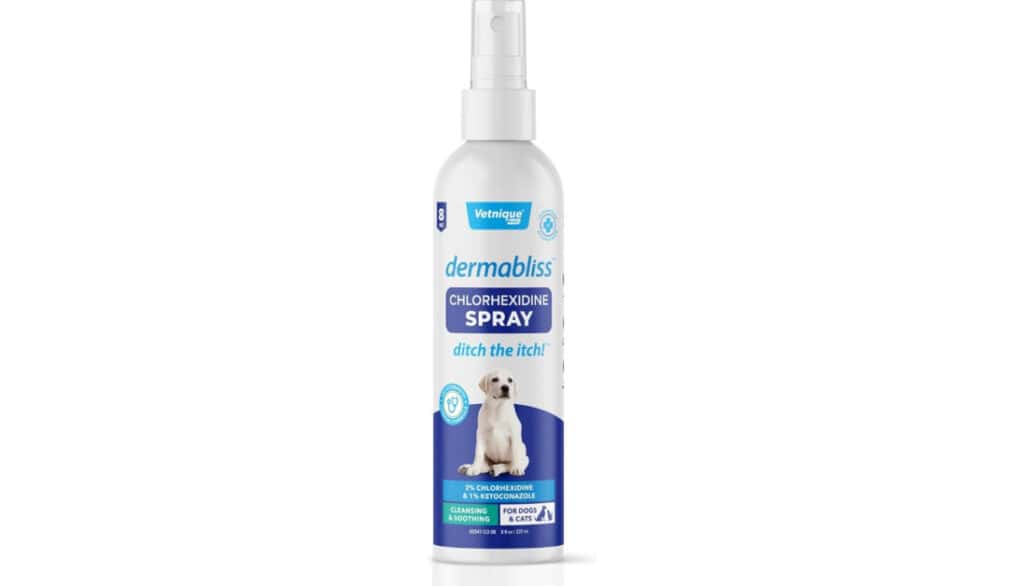Hello, I’m Dr. Candy Akers, and I’ve dedicated my life to the well-being of our furry companions. Over the years, I’ve encountered countless cases of dogs with minor injuries that, if left untreated, can lead to severe complications. It’s a common misconception that a small scratch or cut on a dog will heal on its own without any intervention. However, just as with humans, these seemingly insignificant wounds can become breeding grounds for bacteria, leading to infections and prolonged healing times. That’s why I cannot stress enough the importance of having a reliable antiseptic spray on hand.
In this blog, I’ll be sharing my top recommendations for over-the-counter antiseptic sprays that promote fast healing. I’ll also guide you on the correct way to use these sprays to ensure your dog’s swift recovery. Let’s prioritize the health and comfort of our pets, ensuring they remain active and happy.

Why Do Dogs Need Antiseptic Sprays?
Dogs, with their boundless energy and insatiable curiosity, are natural explorers. Whether it’s a romp in the park, a dig in the backyard, or a playful tussle with a fellow canine, they’re always on the move. However, this active lifestyle also makes them prone to minor injuries. Here’s why antiseptic sprays are essential for our four-legged friends:
- Prevention of Infections: Just like humans, dogs are susceptible to bacterial infections. A small cut or scrape, if left untreated, can become a hotspot for bacteria. Antiseptic sprays act as a first line of defense, killing harmful bacteria and preventing potential infections.
- Quick Healing: Antiseptic sprays not only disinfect the wound but also create an environment conducive to healing. Many sprays contain ingredients that promote cell regeneration and reduce inflammation, ensuring a faster recovery.
- Pain Relief: Some antiseptic sprays come with added pain-relieving ingredients. These can provide immediate relief to a dog in discomfort, making them less likely to lick or bite the affected area, which can further exacerbate the injury.
- Protection from External Contaminants: Dogs love to play in varied environments, from grassy fields to muddy puddles. An antiseptic spray forms a protective barrier over wounds, shielding them from dirt, debris, and other external contaminants.
- Cost-Effective Treatment: Treating a minor injury promptly with an antiseptic spray can prevent complications that might require more extensive and expensive veterinary care in the future.
Antiseptic sprays are an indispensable tool in a dog owner’s arsenal. They offer immediate treatment for minor injuries, ensuring our pets remain healthy and active. As a veterinarian, I’ve seen firsthand the difference timely intervention can make, and I always advocate for proactive care. After all, prevention is always better than cure.
Dr. Candy’s Top Recommendations for Antiseptic Sprays
Over the years, I’ve had the opportunity to evaluate and test numerous antiseptic sprays available in the market. While many of them offer good results, there are a few that stand out due to their efficacy, ingredients, and overall performance. Here are my top recommendations:
1) Vetericyn Plus Dog Wound Care Spray | Healing Aid and Skin Repair
Introduction: The Vetericyn Plus Dog Wound Care Spray is a versatile and effective solution designed to aid in the healing of various skin issues in animals, making it an excellent choice for pet owners. Here are three pros and two cons based on the information provided:
Pros:
- Versatile Application: This product is highly versatile, capable of addressing a wide range of skin issues in animals, including cuts, abrasions, scratches, rashes, and hot spots. Its versatility makes it a valuable addition to any pet owner’s first-aid kit, as it can be used on various types of wounds.
- Non-Cytotoxic Formula: Vetericyn Plus is formulated to clean wounds without causing harm to healthy tissue, creating an ideal environment for proper wound healing. This non-cytotoxic property distinguishes it from some other products on the market, ensuring that it aids in the healing process without causing additional damage.
- Safe and Trusted: Manufactured in the USA by a reputable company, Vetericyn has gained trust among pet owners as a reliable at-home animal health product. It contains no antibiotics or steroids, making it safe for prolonged use, from newborn puppies to aging dogs.
Cons:
- Limited Information: The product description on the webpage lacks detailed information about its ingredients and specific use cases. For customers seeking more in-depth knowledge about the product’s components and how it works, this limited information may be a drawback.
- Potential Sensitivity: While the product is generally safe, individual animals may exhibit sensitivities or allergies to certain ingredients. Pet owners should monitor their pets for any adverse reactions, and it would be beneficial if the product provided clearer guidance on how to identify and handle such situations.
Why I Recommend It: The Vetericyn Plus Dog Wound Care Spray offers a versatile and non-cytotoxic solution for addressing a variety of skin issues in animals. Its safety and effectiveness, coupled with its reputation as a trusted product, make it a valuable addition to any pet owner’s toolkit. However, potential customers may find the lack of detailed information about the product’s ingredients and possible sensitivities as areas for improvement. Overall, it presents a compelling option for pet owners seeking a reliable wound care solution for their beloved animals.

2) Vetnique Labs Dermabliss Dog Chlorhexidine Spray
The Vetnique Labs Dermabliss Dog Allergy and Itch Relief is a pet care product formulated to address common skin irritations and allergies in dogs and cats. This medicated relief spray offers a convenient solution for pet parents seeking to alleviate their furry friends’ skin problems. Below are three pros and two cons based on the information provided:
Pros:
- Veterinary Strength Formula: Dermabliss contains 2% Chlorhexidine and 1% Ketoconazole, making it a veterinary strength formula. This high-potency composition is effective in targeting and addressing common skin irritations in pets, offering a reliable solution for skin issues.
- Soothing and Effective: This spray combines active ingredients with soothing Aloe Vera, providing an effective yet gentle solution for pets’ skin problems. It aims to alleviate discomfort and itching without causing further irritation, making it a suitable choice for pets with sensitive skin.
- Safe for Dogs and Cats: Dermabliss is safe to use on both dogs and cats of all ages, making it a versatile product for pet households. The ability to use it on various pets adds to its convenience and value, catering to a broader range of pet owners.
Cons:
- Limited Information on Ingredients: The product description lacks detailed information about all the ingredients used in Dermabliss. Customers who are concerned about potential allergens or specific components may find it challenging to assess its suitability for their pets without more comprehensive ingredient information.
- May Not Address All Skin Issues: While Dermabliss is designed to address common skin irritations and allergies, it may not be effective for more severe or specific skin conditions that require specialized treatment. Pet owners with pets suffering from such conditions may need to seek alternative solutions or consult a veterinarian.
Why I Recommend It: The Vetnique Labs Dermabliss Dog Allergy and Itch Relief offers a veterinary strength formula for addressing common skin irritations in dogs and cats. Its soothing and effective composition, coupled with its safety for both dogs and cats, makes it a convenient choice for pet owners seeking to alleviate skin problems in their furry companions. However, the limited ingredient information and the potential inability to address all skin issues may be areas for improvement. Overall, it provides a valuable option for pet parents looking for a straightforward solution to common pet skin irritations.
In the vast world of pet care products, these two antiseptic sprays have consistently delivered outstanding results. As a veterinarian, my primary concern is the well-being of our furry companions, and I can confidently say that these products align with that goal. Whether you’re dealing with a minor scratch or a more significant wound, having one of these sprays on hand can make a world of difference.

How To Use Antiseptic Spray For Dogs
Using an antiseptic spray correctly is crucial to ensure the effective treatment of wounds and to promote swift healing. Here’s a step-by-step guide on how to use these sprays for optimal results:
- Preparing the Wound:
- Cleaning the Area: Before applying any antiseptic, it’s essential to clean the wound thoroughly. Gently wash the affected area with lukewarm water and mild soap to remove any dirt or debris.
- Pat Dry: Once cleaned, pat the area dry with a soft, clean cloth or towel. It’s crucial to ensure the wound is dry to allow the antiseptic to work effectively.
- Applying the Spray:
- Positioning: Hold the spray bottle a few inches away from the wound to ensure even coverage.
- Spray Evenly: Apply a generous amount of the antiseptic spray, ensuring the entire wound and its surrounding area are covered.
- Avoid Touching: Try not to touch the wound or the nozzle of the spray bottle to prevent contamination.
- Post-application Care:
- Monitor the Wound: Keep an eye on the wound for signs of healing or any indications of infection, such as increased redness, swelling, or discharge.
- Limit Licking: Dogs have a natural instinct to lick their wounds. However, this can slow the healing process and introduce bacteria. Consider using an Elizabethan collar (commonly known as a “cone”) to prevent your dog from reaching the wound.
- Reapply as Needed: Depending on the severity of the wound and the specific product’s instructions, you may need to reapply the spray once or twice daily.
- Consultation:
- When to See a Vet: If the wound doesn’t show signs of improvement within a few days or if you notice signs of an infection, it’s essential to consult your veterinarian for further guidance.
While antiseptic sprays are a fantastic tool for treating minor injuries, it’s crucial to use them correctly. By following the steps outlined above, you can ensure your dog’s wounds heal quickly and without complications. Remember, our pets rely on us for their well-being, so let’s give them the best care possible.

Benefits of Over-The-Counter (OTC) Antiseptic Sprays
Over-the-counter antiseptic sprays have become a staple in many pet owners’ first aid kits, and for good reasons. These readily available solutions offer a host of benefits that make them an excellent choice for treating minor injuries in dogs. Let’s delve into the advantages of OTC antiseptic sprays:
- Immediate Access:
- OTC antiseptic sprays are available without a prescription, allowing pet owners to quickly address wounds as soon as they occur. Immediate treatment can prevent complications and speed up the healing process.
- Cost-Effective:
- Compared to prescription medications or treatments, OTC antiseptic sprays are generally more affordable. This cost-effectiveness ensures that pet owners can always have a reliable treatment option on hand without breaking the bank.
- Tried and Tested:
- Many OTC antiseptic sprays have been on the market for years and have undergone rigorous testing. Their continued presence on store shelves is a testament to their efficacy and safety.
- Versatility:
- These sprays are formulated to treat a wide range of minor injuries, from cuts and scrapes to insect bites. Their broad-spectrum action makes them a versatile tool in a pet owner’s arsenal.
- Ease of Use:
- OTC antiseptic sprays come in user-friendly packaging with clear instructions, making them easy to apply even for those without medical training.
- Safety:
- Most OTC antiseptic sprays are formulated with safety in mind. They are free from harsh chemicals and are gentle on a dog’s skin, reducing the risk of adverse reactions.
- Travel-Friendly:
- Due to their compact size, OTC antiseptic sprays are easy to carry, making them a must-have for trips, hikes, or any outdoor activity with your furry friend.
OTC antiseptic sprays offer a combination of convenience, efficacy, and safety, making them an invaluable resource for every dog owner. While they are excellent for treating minor injuries, it’s essential to remember that severe wounds or persistent issues should always be addressed by a veterinarian. As always, the well-being of our pets should be our top priority.

Safety Precautions When Using Antiseptic Sprays
While antiseptic sprays are designed to be safe and effective for treating minor injuries in dogs, it’s essential to use them with care. Here are some safety precautions to keep in mind when using these products:
- Read the Label:
- Always start by reading the product’s label and instructions. Different sprays may have varying ingredients and application methods. Familiarizing yourself with these details ensures you use the product correctly and safely.
- Avoid Contact with Eyes and Mouth:
- While most antiseptic sprays are formulated for external use, they can irritate a dog’s eyes and mouth. Ensure you apply the spray carefully, avoiding these sensitive areas.
- Test for Allergies:
- Before fully applying the spray to a wound, it’s a good idea to test a small amount on a patch of your dog’s skin. Monitor for any adverse reactions, such as redness, itching, or swelling.
- Keep Out of Reach:
- Store antiseptic sprays in a place inaccessible to pets and children. While they are generally safe, ingestion or misuse can lead to complications.
- Do Not Substitute for Veterinary Care:
- Antiseptic sprays are excellent for treating minor injuries, but they are not a replacement for professional veterinary care. If a wound is deep, doesn’t heal, or shows signs of infection, consult a veterinarian immediately.
- Wash Hands After Use:
- After applying the spray, wash your hands thoroughly. This prevents any potential transfer of the antiseptic to your eyes, mouth, or other sensitive areas.
- Monitor Your Dog Post-Application:
- Keep an eye on your dog after applying the antiseptic spray. Ensure they don’t lick or scratch the treated area, as this can slow the healing process and introduce bacteria.
- Check Expiration Date:
- Like all medical products, antiseptic sprays have an expiration date. Using an expired product can reduce its effectiveness and may even harm your pet. Regularly check and replace outdated products.
While antiseptic sprays are a valuable tool for pet owners, their safety and effectiveness lie in their correct usage. By following the precautions listed above, you can ensure that you’re providing the best care for your furry friend while keeping them safe from potential risks.

Conclusion
Our furry companions bring immeasurable joy and love into our lives, and in return, it’s our responsibility to ensure their well-being and comfort. Minor injuries, though seemingly insignificant, can escalate if not treated promptly and correctly. Antiseptic sprays serve as a first line of defense, offering immediate relief and promoting swift healing. As we’ve explored in this blog, the right product, when used with care and precaution, can make a world of difference in your dog’s recovery.
But beyond the products and techniques, it’s the diligence and love of a pet owner that truly matters. By staying informed and proactive, we can ensure that our pets remain healthy, active, and by our side for many years to come. After all, they’re not just pets; they’re family. Here’s to many more tail wags, playful barks, and cherished moments with our four-legged friends.
Frequently Asked Questions
Antiseptic sprays for dogs are specially formulated solutions designed to disinfect and promote healing of minor wounds, cuts, and scrapes. Popular recommendations include the GNC Ultra Medicated Antiseptic Spray and Vetnique Labs Dermabliss Dog, among others.
Yes, antiseptic sprays are beneficial for dogs. They help in preventing bacterial infections in wounds, provide pain relief, and create an environment conducive to quick healing. However, it’s essential to choose a product specifically designed for dogs and follow the recommended usage instructions.
The frequency of application depends on the specific product and the severity of the wound. Generally, for minor injuries, antiseptic sprays can be applied once or twice daily. However, always refer to the product’s label for specific instructions and consult a veterinarian if unsure.
Antiseptic sprays for dogs can be purchased at pet supply stores, veterinary clinics, and online retailers. It’s always a good idea to read reviews and possibly consult with a veterinarian before making a purchase.
While some human antiseptic sprays might be safe for dogs, it’s not always recommended. Dogs have different skin pH levels and sensitivities than humans. Using a product formulated for humans might cause irritation or an allergic reaction in dogs. It’s always best to use products specifically designed for canine use and consult a veterinarian if in doubt.
